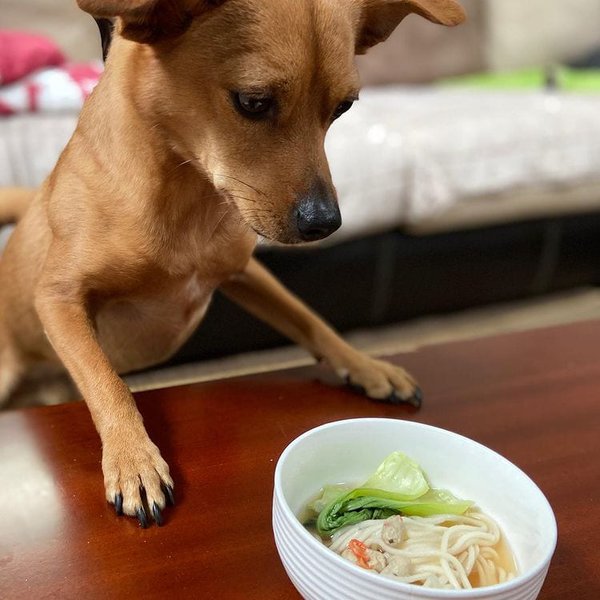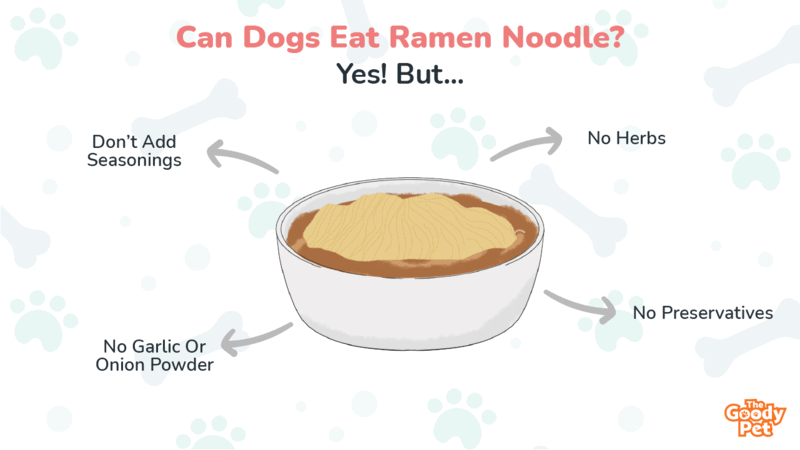Ramen is nothing short of a cultural phenomenon. Whether you are a college student saving money or simply reliving the good ol’ days, it is a nice treat to have every now and then. But can the same be said for your dog?
Dogs should not eat ramen noodles. There are many health-related reasons why you should avoid giving your dog ramen, but perhaps the most important is the high sodium content in the flavoring packets.
It is just the tip of the iceberg when it comes to why dogs should never be allowed to eat ramen noodles. In the sections below, we shall take a look at some of the other concerns that arise from feeding this classic snack to your pooch.
Furthermore, you will learn what to do if your dog somehow sneaks a bite of the noodles or a slurp of the ramen broth. Without further ado, here is all you need to know about dogs and ramen noodles.
Can Dogs Eat Ramen Noodles With Seasoning?
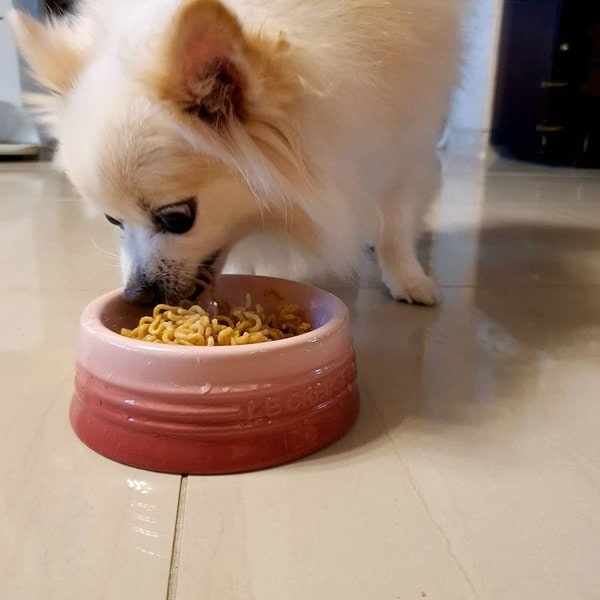
You should never feed your dog ramen, especially if you have added the seasoning packet. This is because seasoning typically contains several ingredients that may be harmful to the dog’s health.
Here is a bit more about these toxic ingredients in ramen noodles and their seasoning packets.
Garlic Or Onion Powder
If ever you look up foods that are considered toxic to dogs, garlic and onions are typically top on the list. These two ingredients also typically appear not only in ramen noodle seasoning packets but also infused in the noodles themselves for the umami flavor effect.
Garlic and onion powder can cause life-threatening anemia in dogs. The concentrated amounts used in ramen noodle seasoning are enough to cause this life-threatening side effect.
Excessive Amounts Of Salt
The average packet of ramen noodle seasoning has between 1.5 to 2 g of sodium. The recommended daily intake of sodium for dogs is 100 mg per 30 lbs of body weight.
It makes the levels of sodium in a ramen seasoning packet as much as 20 times what most dogs need. The high salt intake could cause all sorts of issues for the dog, from dehydration to kidney failure.
Preservatives
Most ramen noodles and their seasoning packets include artificial preservatives meant to increase their shelf life. These preservatives are likely to have numerous long-term side effects on the dog’s health.
The worst part is that the effects are very non-specific. However, continuous exposure to the chemicals could contribute to their risk of developing cancer for many dogs.
Herbs
The herb you have to worry about in this case is thyme which is a common feature in many ramen noodle seasoning packets. Those that include dried versions of the herb are the worst as the dog may not be able to fully digest the fibers.
This results in digestive issues for the pooch, including bloating, constipation, and general discomfort.
Chilli Powder Or Paste
What is ramen without a bit of a hot, spicy kick? Well, for dogs to handle this degree of spiciness, it usually results in almost immediate digestive irritation.
If the dog consumes large amounts of ramen and spicy broth, they may even end up with serious complications like excessive thirst, ulceration of the digestive tract, and other gastrointestinal problems including inflammation-related pain, gas, and bloody diarrhea.
Can Dogs Be Allergic To Ramen Noodles?
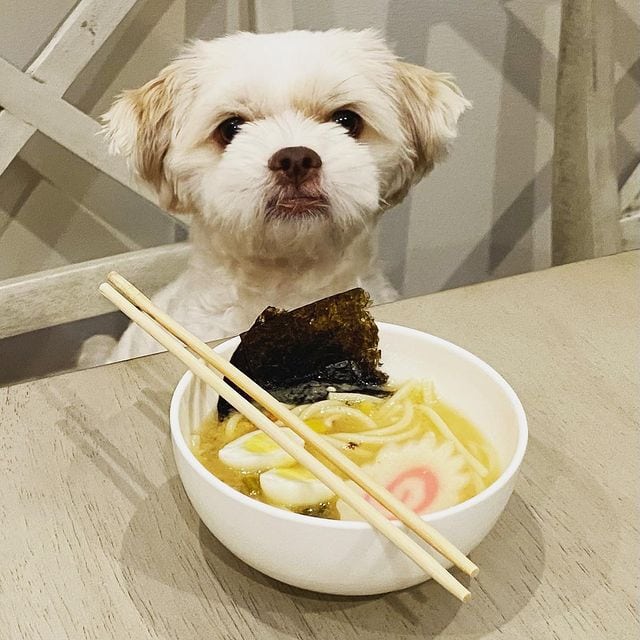
It is possible for your dog to be allergic to ramen noodles. It all depends on your dog’s sensitivity levels to the ingredients used in the ramen noodles and their seasoning packets.
Here are some of the most common ramen-related allergies that your dog may have.
Gluten Intolerance
Most ramen noodles are made from wheat and are thus full of gluten. If your dog is sensitive to gluten, it may only take one bite to throw your pooch into a world of abdominal discomfort.
Lactose Intolerance
Dairy is not a common component in ramen noodles. However, some brands have cheesy ramen flavors. If your dog is allergic to dairy, these kinds of ramen could trigger a reaction in your dog.
Meat Allergies
Meat allergies are rare but not unheard of in dogs. Considering that meat or meat extracts feature heavily as ingredients in seasoning packets for ramen noodles, it probably explains how ramen could have triggered your dog’s meat allergies.
The effects in these cases are worst with ramen noodle brands that actually include preserved chunks of meat in their preparations.
Soy Allergies
Ramen noodles may contain soy extracts, or the noodles are thought to be prepared in companies that also handle soy as an ingredient. If your dog is sensitive to soy, these noodles could trigger an allergic reaction.
Soy allergies in dogs typically manifest with skin irritation. You may therefore notice your dog licking or scratching themselves excessively. In very severe cases, they may develop skin lesions or hair loss from the consistent scratching.
Can Dogs Eat Ramen Without The Seasoning?
Dogs can eat ramen without the seasoning, but it is not always a good idea.
It goes without saying that the seasoning packets in ramen noodle packages are what contain the most toxic ingredients to the dog.
However, the plain noodles might also be infused with the same ingredients for a stronger flavor punch. This includes things like salt, garlic, and onion powder, preservatives, and artificial flavor enhancers.
Unfortunately, it is usually hard to differentiate noodles made with flour and water from those that are seasoned. It is, therefore, best to avoid ramen noodles altogether whether or not you add the seasoning.
However, if you are sure that the noodles in the ramen are plain and your dog is not allergic to gluten, you may occasionally give some to your pooch as a treat.
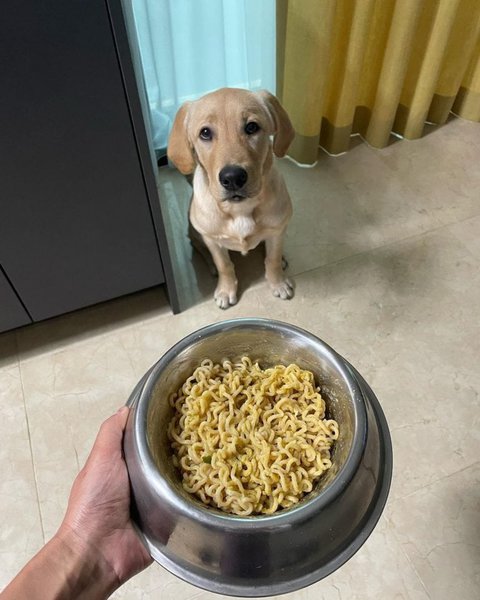
What Happens If A Dog Eats Ramen?
If your dog eats ramen, they will either react to the toxic ingredients or to ingredients that they are allergic to. Some of the side effects are immediate and dramatic, while others take long-term exposure to manifest.
Here is all that could go wrong if your dog eats ramen noodles.
Gastrointestinal Irritation
Gastrointestinal irritation in dogs after eating ramen is triggered by toxic ingredients like spices, herbs, and artificial preservatives. The irritation could be mild but could also be severe enough to cause life-threatening diarrhea and bloating.
Hypernatremia
The high sodium content in ramen seasoning packets puts dogs at risk of developing hypernatremia, especially if they consume a lot.
Hypernatremia is a condition where there are excess levels of sodium in the dog’s body. Signs and symptoms of hypernatremia in dogs include:
- Excessive thirst
- Confusion
- Seizures
- Reduced activity levels
- Changes in urine output frequency and volume
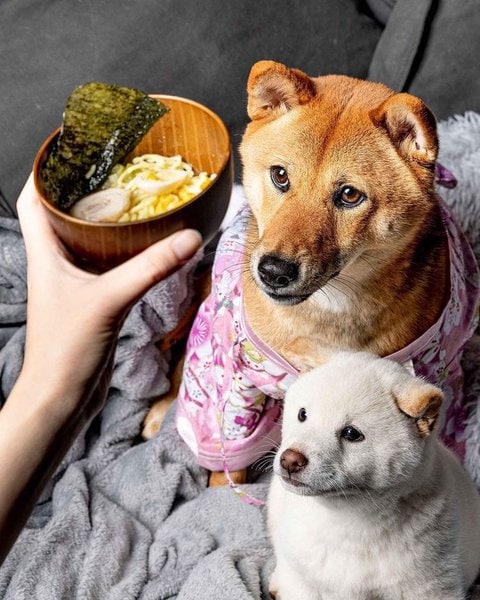
Kidney Failure
Kidney failure after a dog consumes ramen noodles typically occurs as a consequence of dehydration from the high sodium intake. It could also be a result of toxicity from other ingredients, including flavor additives and preservatives.
Kidney failure may occur within days or years, depending on the ingredients in the ramen and the amounts that the dog has consumed.
Allergic Reactions
Ramen noodles contain several ingredients that your dog may be allergic to. These include meat, soy, nuts, gluten, and in some cases, dairy.
Your dog may therefore suffer an allergic reaction if they take ramen with manifestations in different systems from the skin to the gut.
Can Dogs Eat Raw Ramen Noodles?
If the noodles are free from preservatives and flavor or color additives, you may feed your dog raw ramen noodles as a snack. This only applies to the ramen noodles that come pre-fried for preservation, in which case they are technically not dry.
However, it is important if you give your pooch these crunchy treats that you are careful about the chunks you pinch off for them. This is because raw ramen can be a choking hazard for the doggy, especially with young pooches or those that eat too fast.
To be safe, break the “raw” ramen into sizes similar to their kibble.
